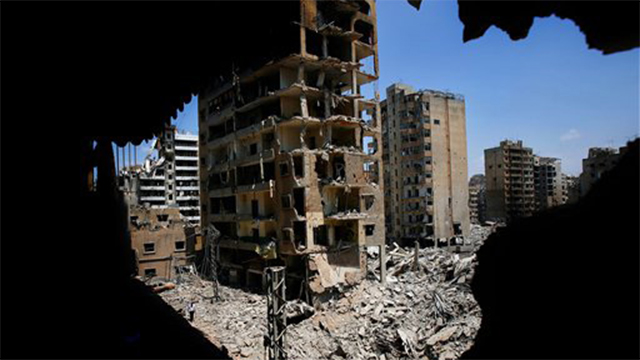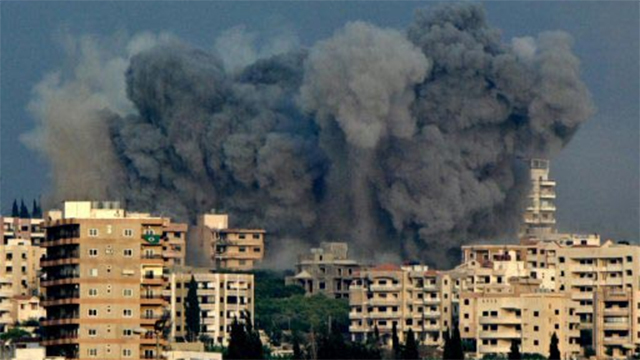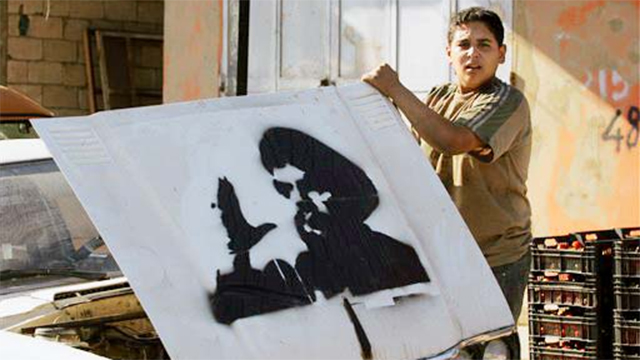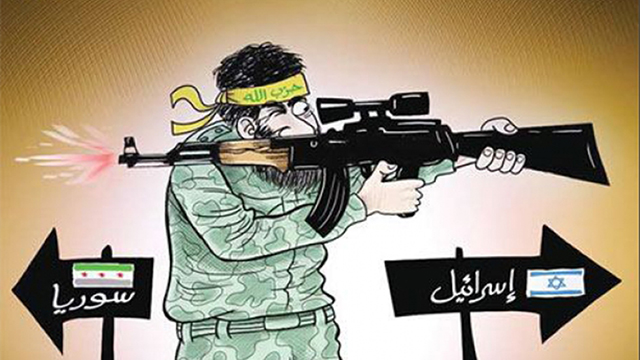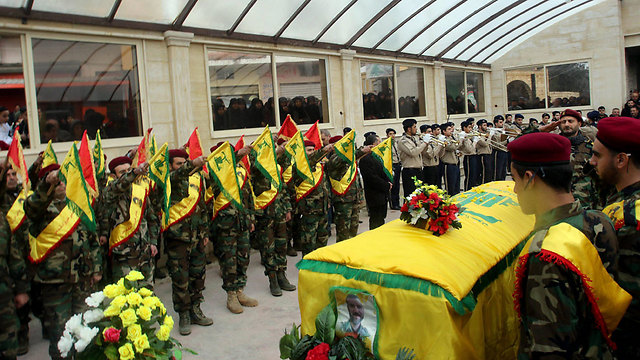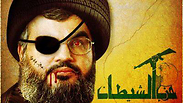
The war from the Lebanese side
Despite the clear signals showing that the Lebanese people don't want a war with Israel, Hezbollah is still gearing up for the next round of fighting 10 years after the Second Lebanon War. Hezbollah is losing its standing in Lebanese society, and may feel pressured to prove itself once again as the 'heroes of Lebanon.'
"Rescue Lebanon!" he begged them.
His tears were a direct contrast to the triumphant speeches given by Hezbollah Secretary General Hassan Nasrallah as the war waged on. The differences in mood between the Sunni President and the head of the Shia terror group show the immense divides in public opinon 10 years after the Second Lebanon War.
The summer of 2006 saw Nasrallah at the height of his rock star popularity. Perfume shops were selling Nasrallah cologne, and china shops were selling plates with Nasrallah's face on them.
He was able to unify the various sects in Lebanon through a process which academics would term "Lebanonization." Even before the war, Nasrallah was downplaying the Shia-Islamism and pro-Iranian agenda which his organization represented, and was highlighting his organization as a Lebanese national movement which only wanted to integrate into local politics. The Second Lebanon War was presented to the Lebanese people as a part of this framework.
According to Dr. Omri Nir, a researcher specializing in Lebanon at Hebrew University, Nasrallah stressed that Hezbollah and the Shia population sacrificed their lives and their homes to make sure that Lebanon wouldn't not be occupied by Israel.
"It gave Shia in Lebanon access to Lebanese society. The Lebanese Shia population was always treated as a population more loyal to Iran (than Lebanon -ed). And now, these are the people who paid with their own flesh and blood for the sake of Lebanon."
This war strengthened Hezbollah's standing for the very short term. This is because there was a second side to the war – the tangible effects of it; destruction, death, and mass casualties.
According to Dr. Nir, the people in Lebanon began to ask themselves if Hezbollah's evolution – from resistance organization to part of the government – would lead Lebanon to the brink of destruction.
This question opened up a public debate which continues to this day, and there are more and more people who are coming to the conclusion that the Second Lebanon War was a tactical move by Hezbollah to try and take over the country.
"After 10 years, what stands out most in Lebanese society are the memories of the war, which have turned into a restraining factor," said Professor Nir. "For Hezbollah, it's not just a fear of Israel, but a fear that it will be viewed by the Lebanese public as a group which might lead to more violence in Lebanon."
$9.5 billion in damages
Little by little the results of the war are being exposed to the Lebanese population; 1,200 dead, thousands of injured, and hundreds of thousands who lost their homes..
The majority of the approximately 30,000 buildings which were destroyed were located in the Hezbollah stronghold of Dahiya in the southern section of Beirut. Dozens of bridges were also destroyed, along with miles of roads and infrastructure. All of Lebanon's ports and its international airport were either hit or destroyed, as were a large portion of the factories in that country. The overall cost to the Lebanese economy was estimated to be $9.5 billion.
In 2013 University of Beirut economist Professor Jassem 'Ajafa said "We lost approximately $10 billion in the war in 2006, and the next war won't be any better." He urged Nasrallah to not drag Lebanon into a new war which will lead the Lebanese economy to the precipice of collapse again, especially during the summer tourist months which are critical for the Lebanese economy and GDP.
Despite marketing the war as a "divine victory," a sense supported by the feeling in Israel that it had failed militarily, Hezbollah doesn't come out blameless in its handling of the war or its results. It's important to remember that Nasrallah has been hiding in his bunker since August 2006.
Hezbollah forces went out of control
An Arabic news publication had a wide ranging examination which attempted to determine what kind of impact the Second Lebanon War had on Lebanese society and Hezbollah's standing in Lebanese society in 2011. The headline read "Five years after the war; divine victory or the legitimization of Hezbollah's weapons hegemony?"
A resident of the Dahiyah neighborhood of Beirut named Umm Husain was interviewed for the article. She lost her home, but had the chance to meet with Nasrallah. "He brought us divine victory," she said. "He has brought us pride amongst the Arabs."
Her neighbor Zeinab Aish added that "while it's true we lost our possessions, we were able to reconstruct everything, and now our houses are nicer that they were before. Hezbollah didn't forget about us."
But behind their statements lies a Lebanese and perhaps even international failure. The day after the ceasefire came into effect on August 15, 2006, Hezbollah representatives came with cash and handed out $12,000 to every family who lost their home. Dr. Nir suggests that "If the West would have handed out cash that quickly instead of Hezbollah, Hezbollah would have been remembered as the group which brought destruction to Lebanon."
These two women represent one side of the equation. In the same article, people who are opposed to Hezbollah from within the Shia community gave their negative opinions.
One of these people said that "the gulf that exists in Lebanon only got wider after the war and after Hezbollah turned into an uncontrollable force. The war gave Hezbollah an unusual amount of power because they believed that they had triumphed as no other Arab country had before."
The issue of "legitimizing Hezbollah's weapons" is one of the most pressing issues in Lebanon from the war. The issue's climax came following a trial two years after the war whereby Hezbollah engaged in street battles with Lebanese political factions who didn't want Hezbollah to be in control of Lebanese telecommunications. The battles lasted a week, and saw 11 people killed and 30 wounded in what would be known as the "2008 conflict in Lebanon."
In the Arab press article from 2011, a man who was involved in the battles said "Israel is everyone's enemy, but we hate it when they (Hezbollah) turn their weapons on Beirut as opposed to Israel."
'One eye on the south, the other on Aleppo'
Yet despite the lively public debate, not only can the fact that Hezbollah has amassed a huge arsenal of weapons be changed, but neither can the fact that these weapons are currently pointed at Sunni rebels in Syria as opposed to Israel. In a meeting with Hezbollah fighters, Nasrallah said in one sentence a very apt summary of the change in the organization's priorities. He said "one eye to the south (Lebanon), and one eye on Aleppo."
Nasrallah's effort to help his ally Bashar Assad was done in the hope of strengthening Hezbollah's position as a "defender of Lebanon" from the alleged Sunni extremist threat which might spill over into Lebanon. Dr. Nir said that "even Hezbollah's Christian rivals know that if ISIS comes to Lebanon that ISIS will slaughter the Christians. There are Christian villages in the Bekaa valley who are trying to buy weapons from Hezbollah."
There are an estimated 7,000 Hezbollah fighters in Syria. On the one hand, the organization is gaining valuable experience for its future war with Israel, all the while maintaining its rocket arsenal of over 100,000 rockets which can hit every city in Israel. On the other hand, Hezbollah has lost a lot of soldiers in Syria – approximately 1,400. This is double the number they lost in the Second Lebanon War.
However, despite Nasrallah's best efforts, the war in Syria is having an impact on both the Lebanese public's impression of the organization and on the morale of its fighters. Hezbollah's reputation as an organization which is resisting Israel is getting smaller and smaller, while it is getting a reputation for being a Shia agent for the Iranians is only increasing.
One can see in an op-ed published in the Hezbollah affiliated A-Safir on the 16th anniversary of the Israeli withdrawal from Lebanon which said that the Takfiri groups – the extremist Sunni groups – are the organization's main priority, not Israel.
This criticism can also be seen outside of Lebanon. Hezbollah's reputation as the hero of the Arab world has taken a harsh hit following Hezbollah's involvement in Syria. The organization's low point was when the Arab League recognized the Shia group as a terrorist organization.
Where will the Shia go?
The Shia population in Lebanon – the population which Hezbollah is supposedly most attuned to – hasn’t accepted the reality of a new war with Israel, especially with the destruction of their houses in 2006 still fresh in their memories.
They are at a crossroads, and it doesn’t seem like they will be ready for more war with Israel any time soon. Ten years have passed since the initial euphoria. The residents of southern Lebanonare depressed that they are losing their sons in Syria.
Hezbollah has always been worried; worried about what's going on in neighboring countries; from Sunni Jihadist groups; from the consequences of being an Iranian puppet; and from the bad economic situation in Lebanon. There are signs of stress which aren’t being shown publicly, and the criticisms aren't being said out loud. However, it is clear that Hezbollah's arrogance has significantly diminished.
Meanwhile, the organization is being affected by the demographic changes happening in Lebanon due to over a million Sunni refugees coming into the country from Syria. Additionally, the pre- 2006 rivalries between the various sects in Lebanese society still exist.
In south Lebanon and Dahiya its impossible to see the devastation from 10 years ago. Its also impossible to see Hezbollah's enormous arsenal tucked away in Shia villages in southern Lebanon, waiting to be fired. While Hezbollah is preparing for more violence, the memories of the destruction from the last war are still fresh in the Lebanese collective memory.
Yet despite everything, ten years after the summer of 2006, Hezbollah is preparing for a third Lebanese war. The war can break out at any moment, even if neither side wants it.










